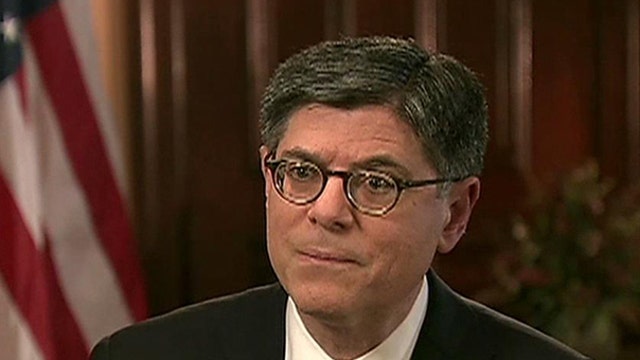Lew to FOX Business: Treasury Out Of Tools To Pay US Bills
U.S. Treasury Secretary Jack Lew told FOX Business Thursday that he is out of tools – known as extraordinary measures – and will not be able to pay the U.S.’s bills if Congress fails to raise the nation’s debt limit by Oct. 17.
In an exclusive interview with FOX Business’ Liz Claman, Lew said the Treasury Department has taken every measure possible to extend Treasury’s ability to pay U.S. debts as Congress faces off in a budget stalemate that has shuttered parts of the government since Tuesday.
“There is the dangerous notion that there's always something else in the drawer. Congress needs to understand that on Tuesday, I took the last steps I can take to create borrowing capacity,” Lew said.
In addition to negotiating a budget agreement that would reopen federal agencies closed by the impasse, Congress also has to vote on raising the U.S. debt limit. Treasury has warned that the U.S. will run out of money to pay its bills by mid-October.
“I don't have any more -- what used to be called extraordinary measures. They're used so frequently that extraordinary seems a little bit of an overstatement now. They're accepted tools of managing to the limit. We don't have any more. We just don't have any more. And Congress has to act,” Lew added.
The secretary said the U.S. is entering unprecedented territory as the Oct. 17 deadline approaches and he urged Congress to act before the U.S. is forced to default on its debts, a situation economists have warned would have a devastating impact on U.S. and global markets.
We’ve Never Crossed that Line
“On October 17th we will run out of the ability to borrow money,” Lew said. “That has never before happened in American history, unless Congress acts as Congress has always acted in the past to permit the United States government to continue to borrow.”
Once the U.S. runs out of the ability to borrow it will have to operate on cash, Lew explained, and the cash won’t last long.
“We've never crossed that line and Congress shouldn't let that happen now,” he said.
Just over two years ago Congress faced a similar impasse over the debt limit and ratings firm Standard & Poor’s responded by lowering the U.S. credit rating, an unprecedented move that roiled financial markets for weeks.
Lew referenced that earlier standoff in his interview with Claman.
“Last time we saw market reaction to the threat of default -- we never actually crossed the line. No one knows with certainty how bad the consequences are if we cross the line,” he said.
Lew wouldn’t speculate on whether the U.S. credit rating would be threatened again if the standoff extends beyond Oct. 17 but pointed to the 2011 situation in which S&P lowered the U.S. rating from its AAA standing.
“I doubt that we want to open the door to find out what happens if the United States actually fails to pay its bills on time,” he said.
Earlier Thursday, Treasury released a report saying a U.S. default could have a “catastrophic” effect on the U.S. economy.
Given the economy’s already fragile state, the Treasury Department said that a U.S. default and its ripple effect through the global economy could lead to frozen credit markets, a plunge in the value of the dollar, skyrocketing interest rates, all of which could instigate a financial crisis mirroring that of 2008 “or worse.”
U.S. Has No Playbook Beyond Oct. 17 Deadline
Lew echoed some of those sentiments in his interview with Claman, saying the U.S. has no playbook after the cash runs out beyond the Oct. 17 deadline.
“What I can tell you with certainty is we will not be able to meet all of the obligations, pay all of the bills if we don't have enough cash. And there's no good outcome to where you end up,” he said. “I mean I think that everyone understands that not paying interest and principal on the debt would be catastrophic.”
Lew said Congress needs to raise the debt limit so that the U.S. can make timely payments on Social Security, veterans’ compensation and on Medicare and Medicaid payments to hospitals and other health care providers.
“Congress just needs to raise the borrowing authority to permit the normal functioning of government and to let us pay our bills,” he said.
Lew stressed that raising the debt limit does not permit the U.S. to spend more, rather it simply allows the U.S. to pay debts it already owes.
“It would be like saying after you left your credit card you're choosing not to pay your bills. That's not the United States,” he said.
No good can come out of it if Congress fails to raise the debt limit, the secretary predicted.
“It only hurts the economy and why would anyone want to do that to the American economy when the American people are just recovering from a recession and their resilience is showing through. And government, frankly, should be part of the solution, not the problem.”




















